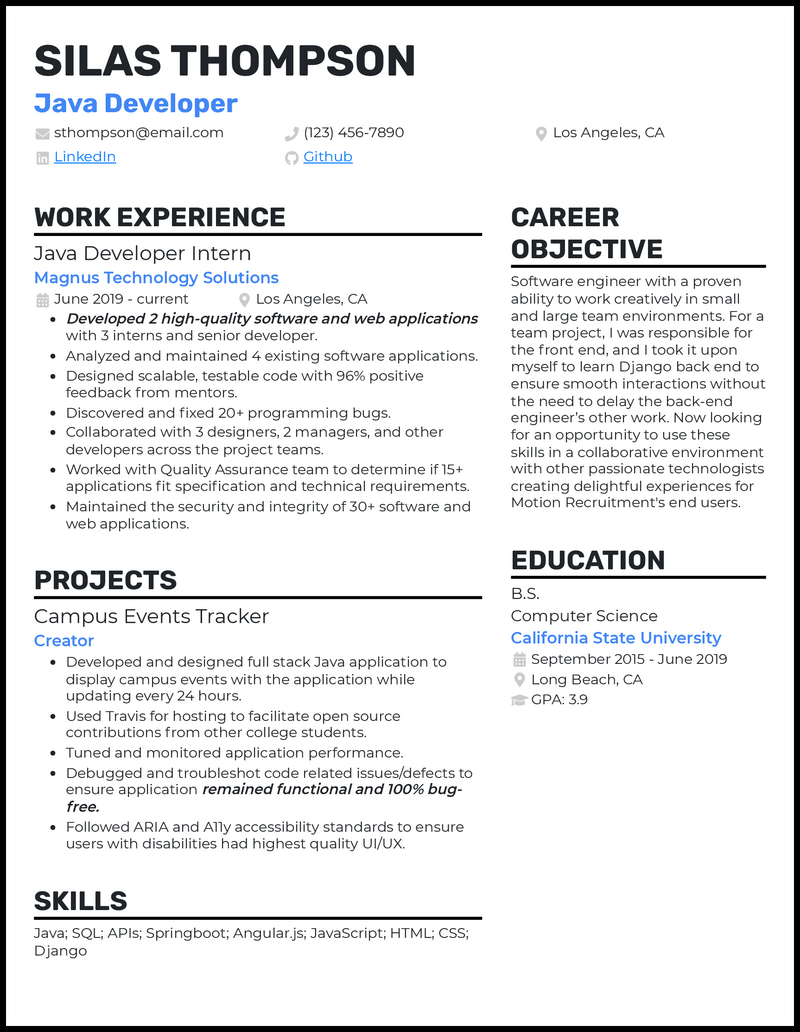As a junior Java developer, you weave intricate webs of code and identify issues if and when they arise. From building compelling apps to swatting complex technical bugs, you’ve proven yourself to be a rising star in the software development space.
You’ve already dabbled in many projects, but your most important project yet still lies ahead—finding a new job. For that, you’ll need to create a resume that captures attention, but how do you effectively showcase all your skills on a single-page sheet?
We’ve got your back. Our junior Java developer resume examples and resume tips helped programmers like you kickstart their careers. Here’s how you can spruce up your application, create a cover letter and land more interviews.
Why this resume works
- The recruiter has seen so many horrific junior Java developer resumes they’re on the verge of getting PTSD. Their saving grace? They’re picky and only read standout pieces. Tell you what, calling attention to your wins during a job-relevant internship stint can help you make the cut.
- Take the lead from Silas, who brags about developing two high-quality software and web applications with three other interns to discover and fix 20+ programming bugs. Screams, “I’m right up your alley,” right?
What Matters Most: Your Programming Skills & Java Experience

With technical skills to boot, you possess what many recruiters in the tech space are seeking, so you’re off to a good start.
You’re already familiar with software development methodologies like Agile and Scrum, and you’ve learned to put your Java skills to work through code reviews, debugging, and writing code.
Emphasize the skills you’re most confident with—be it Java itself or front-end languages like HTML/CSS and JavaScript. Don’t forget your knowledge of version control systems like Git.
Frameworks are important too. As a junior dev, employers might expect you to know Spring/Spring Boot, Hibernate, or Apache Struts, so adding them in will give you an extra edge.
9 most popular junior Java developer skills
- Java
- Debugging
- HTML/CSS/JavaScript
- JDBC
- Git
- Hibernate
- JVM
- RESTful API
- Spring Boot
Sample junior Java developer work experience bullet points
The “work experience” section of your resume might seem intimidating when you don’t have a whole lot of on-the-job programming experience, but don’t worry. Recruiters understand that you’re just starting out.
Instead, this is the place to talk about your overall coding background. This means things you’ve worked on in college, during a bootcamp, or your own passion projects.
The key to making an impression here is to be specific and use quantifiable metrics whenever possible. Consider including figures like percentage improvements in application performance, the number of bugs you fixed, or how often you participated in code reviews.
For instance, instead of just saying that you assisted in debugging Java-based applications, include some concrete figures with it to illustrate your impact and say, “Collaborated with a team to debug technical issues on Java-based applications, reducing system downtime by 20%.”
Here’s how to make your experience shine:
- Participated in bi-weekly code reviews in a team of 11 developers, improving code quality and reducing system downtime by 13%
- Assisted in reviewing and recommended changes to existing Java infrastructure, improving system efficiency by 7% through changing 119 lines of code
- Utilized Hibernate to interact with the MySQL database, reducing SQL injection threats by 23%
- Used JUnit to develop 14 tests for each module, resulting in a 30% reduction in bug discovery time and an overall improvement in code reliability
Top 5 Tips for Your Junior Java Developer Resume
- Zone in on your coding proficiency
- Don’t be afraid to go all-in on technical skills in your resume. Underscore your knowledge of Java, HTML/CSS, JavaScript, and frameworks like Node.js or JSF. Don’t forget to toss in some software you use on a daily basis, such as IntelliJ IDEA or Eclipse.
- Mention your hunger for knowledge
- You’re most likely doing a little bit of coding every single day, so highlight it in your cover letter. You should also mention any industry-specific events you’ve gone to, such as JavaOne, or open-source projects you contributed to.
- Create a robust portfolio
- It’s increasingly important to have an impressive portfolio when applying for competitive Java dev roles, so put a link to it at the top of your resume. This can be your GitHub repository or a personal website filled with projects you’ve worked on.
- It’s not just about creating
- As a junior, you’re not just creating new code—your daily work will include a lot of testing, debugging, and reading documentation. To show that you know the reality of the job, mention things like doing code reviews or debugging the existing Java codebase to reduce system crashes.
- Don’t overdo it
- Listing too many different back-end and front-end skills might make recruiters doubt your abilities, so don’t overdo it. If you’re not a full-stack dev yet, limit yourself to the skills you know well, such as Java, JavaScript, and all the frameworks you’re proficient in.
For a greater chance of success, you should never re-use the same resume. Instead, tailor it to match the job description and even slip in mentions of the company you’re applying to when applicable.
The most important sections to include are education, skills, projects, and work experience. Remember that education also covers bootcamps and certifications like OCAJP.
As a junior Java developer, a career objective can be a good way to quickly show recruiters that your vision aligns with the company. Make sure to update it for each job!










